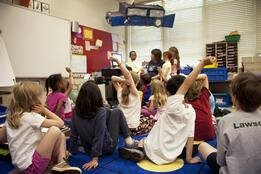
Parent Talk
Archive
- October 2024
- September 2024
- July 2023
- May 2023
- March 2023
- February 2023
- November 2022
- October 2022
- August 2022
- July 2022
- June 2022
- April 2022
- March 2022
- January 2022
- December 2021
- November 2021
- September 2021
- August 2021
- June 2021
- May 2021
- April 2021
- February 2021
- January 2021
- December 2020
- October 2020
- September 2020
- July 2020
- June 2020
- May 2020
- January 2020
- August 2019
- November 2018
- October 2018
- September 2018
Interested in older blogs? Find them here

Children seek extra attention as a way to connect
You know you have an attention-seeking child if you have a child who always interrupts you when you are on the phone, picks on siblings when you are busy, wants to play when you are working or cooking, is always forgetting things, becomes mischievous or doesn’t follow through on agreements or constantly asks “why?” You find yourself repeatedly nagging, reminding or otherwise engaging. Attention-seeking children keep us busy with them by…

A misbehaving child is a discouraged child
I’ve recently picked up child psychiatrist Rudolf Dreikurs’ book “Children: The Challenge”. It’s a classic and some of the examples are outdated yet the philosophy about what children need and what motivates their behavior is so right on. It is this philosophy, originally developed by psychologist Alfred Adler, that is the foundation for many parenting programs including Vicki Hoefle’s work and “Positive Discipline”.
The idea is that all human behavior has a purpose and that purpose is to attain some sort of goal. We are social beings, and as such our ultimate goal is to feel a sense of belonging and significance within our immediate group (the first of which is our family). As such a child’s behavior is a means to attain the basic goal of feeling they belong and finding their place in the family.
Through trial and error and by trying on different behaviors children decide which behavior works to get their needs met. As Dreikurs says, children will “repeat the behavior that gives them a sense of having a place in their family and abandon that which makes them feel left out”. If productive behaviors don’t give them this sense, they will try on “misbehaviors” to see if this new way of acting gives them a better sense of belonging.
Interested in understanding more about how this works? Read on!

Behavior Development and the Crucial C's
Parents often come to me baffled by why their children are behaving a certain way. Rightly so. The hitting, screaming, whining, vies for attention, snarky responses, disrespectful attitude or defiance. We are good parents. We take care of our children, love them and give them what they need. Why do they get so upset or treat us so poorly?
There is a purpose for or reason behind every behavior, and it's often an attempt to reach some sort of goal. The first step in working with your child or teen's challenging behavior is what I call becoming a "behavior detective" – understanding where that behavior is coming from.
The topic of behavior development can be complicated and by no means will I be able to cover it all here, but in general a child’s behavior develops from a few simple places: genetics, brain development, interaction with others and the environment around you, and an attempt to get certain essential needs met.
In my most recent blog I talk about behavior as developing in a social context – within the relationships we have in our families. It develops as a result of how we are responded to, what others believe about us and the strategies we use to get certain crucial needs met…

Parent with Intention in the New Year
Happy New Year!
As 2021 rolled in I realized that I’ve written over 30 pieces for Jackson Hole News & Guide’s “Parent Talk” column. When I started writing I originally intended to write in a linear fashion where topics about child behavior and raising kids built upon one another. However, as I began to write, ideas came in that didn’t necessarily flow linearly. My work with parents would bring up new ideas to write about, and it seemed vitally important to begin discussions on current events such as the college admissions scandal (see my five part series on that subject found here and here), a deadly pandemic (see my columns on parenting during the coronavirus the impacts of school closures, living in lockdown and a parents role in hybrid learning), or racial injustice and the Black Lives Matter protests (see columns on having open family conversations about antiracism and specifics on how to talk to your children about race).
These topics continue to be important, and I’m sure these and new events will compel me to write. Yet now as the new year begins I’m also feeling drawn toward examining important ideas about the development of adolescent and child behavior and the parent-child relationship in a more linear progression.
I believe so strongly in our role as parents in helping our children grow into healthy adults in a way that gives them the tools to not only weather and rise up from society's challenges but to also take action, create change and make the world a better place. In order to do this it helps to start with a foundation.
Read this week’s column in Jackson Hole News & Guide where I ask you to start with a vision of what you want for your family and give you specific exercises to think about…

What is a Parent's Role in Hybrid Learning?
“What is my role as a parent in supporting my child’s at-home learning?” This is one of the biggest questions I’m hearing from parents.
The scenario is often a derivation of something like this: My son is having a hard time turning in his assignments. My daughter is on her device all the time – even during Zoom class. My child isn’t motivated. They aren’t engaged. They are in their room all the time. Their grades are suffering. They have stopped showing up for online school.
Parents then wisely ask the question, “Do I constantly monitor my child’s school work and dictate when and how they do it, or do I make it clear that it is their responsibility and let them fail at times?…

Parenting is tough; it's OK to ask for help
There were times when my kids were little when I would find myself, hands in the air, looking toward the sky and thinking “I have no idea what to do in this moment” as if I were asking for divine intervention to swoop down and wave its magic wand to create the peace I so deeply desired.
Yes, parenting did not come easy to me. I loved my kids to death – and continue to – and I found loads of joy in being with them, but when the you-know-what hit the fan and emotions were raging, all I wanted was calm, rationality and control. I was at a loss. A complete loss. There were moments when I hated how my children and I interacted – the tantrums, the high emotions, the bedtime battles, the neediness – and my lack of ability to deal with it all effectively.
As I wrote in my previous column, parental burnout is real, and I imagine there were times when I was there. I knew I needed help – I wanted help – but I didn't know how to ask, where to look, and I was afraid anyone I talked to wouldn't be able to talk to me in a way that aligned with my thoughts on parenting. So I struggled – and worked really hard to figure it out on my own. But I lost a lot of good time with my children, which could have been avoided if I had gotten help.
Don’t make the mistake I made. As I write in last week's Jackson Hole News & Guide, you don’t need to suffer through challenged family dynamics. Asking for parenting support in no way means you are a bad parent – rather the contrary – it means you care enough to take the time to work on things that don’t feel right. You and your children will benefit. Time is precious with our children – and so are you!

School, child care closures have trickle-down effects
In this week’s Jackson Hole News & Guide I talk about how school and childcare closures can impact parents in two very important ways: the ability to go to work, and parents’ mental health. I also talk about how these closures impact the economy.
The ripple effects of the coronavirus have had a significant impact on the mental health of parents. Seventy-one percent of American parents are reporting that managing their children’s distance/ online learning is a significant cause of stress and 70% are reporting the same about meeting their family’s basic needs (i.e., food, housing). Parental burnout is real and on the rise.
If you feel you are headed in this direction, I invite you to reach out. If your family dynamics are challenging, don't wait until you’ve reached the edge. If cost is a barrier, know that I never want to turn away families because of an inability to pay. I offer a sliding scale to work with individual family budgets and work virtually with families one-on-one or in groups.
Finally, after reading my column, consider this. If schools and childcare centers must close, and you are creating at home learning pods, would you be willing to include families who may not have the ability to do this themselves?

Creating a roadmap to reach family goals
Creating a roadmap to reach family goals
7/29/2020
I spend a lot of time in my Jackson Hole News & Guide columns suggesting that parents focus on who they want their kids to be as a foundation in raising their children. Columns titled “Think who, not what, you want your kids to be” or “Rather than wanting 'what’s best,' start with a vision” ask parents to get to the heart of who they want to be as parents and who they hope their kids become.
Knowing our “why” in our parenting worlds can help anchor us to a practice of showing up every day for our children in a way that helps them develop into the who: kind, capable, resilient, generous and contributing people. Why are you parenting? Why did you become a parent? What was your vision when you held your newborn in your arms?
Sometimes our current reality doesn’t match our vision. We are not always the parents we set out to be when our kids are not doing what we want. We become naggy, bossy, demanding, angry and my go-to: critical.
Often these default responses come because we don’t know what else to do (and they are often remnants from how we were parented). We can continue to “wing it” and hope that someday our kids will fall into line and behave according to our expectations, but ask yourself: do these strategies of nagging, bossing, time-outing, and punishing really work? Do they get the behavior to change for the long term and do they get you to your “why”: a strong mutually respectful relationship, a child who can think independently, take care of herself and be considerate of those around him, and a parent (you) who your child will later describe as encouraging, accepting, supportive, loving or fun?
Or, you can parent with a plan. Think about it -- we make plans for most things we do: getting a project done at work, meeting up with friends, cooking a meal, or going on a trip. And you may have plans that involve your kids: bedtime routines, getting out of the house or helping with chores.
Yet I’ve heard from so many parents that while they have established routines or charts, nothing is really working. Bedtime still takes an hour and ends in tears. Getting out of the house is still filled with nagging reminders, refusals to move forward and stressed parents. And kids still don’t contribute in the household even though chores have been established a long time ago.
Introducing Vicki Hoefle’s parenting roadmap. What is a parenting roadmap and how does it work? Find out by reading my column in this week’s Jackson Hole News & Guide.

Anti-racist families start with open conversations
My greatest wish is for children to grow up to feel and be accepted for who they are; to be healthy in all aspects of the word -- emotionally, mentally, physically, spiritually; to believe in themselves and feel good about who they are -- not because of what they have done -- but merely because they were born; and to be able to move through the world with a sense of agency and capability. My greatest hope is for families to thrive, to know how to navigate challenges and come out the other side, to care for and take care of one another and to find ways to contribute to their larger community.
That is why I’m in this work. Being a parent and raising children is hard. With the right support, though, I don’t think it needs to be that hard. So I work to support parents on their heartfelt journey of raising children in today’s fast paced and ever changing world.
While there are times I talk in universals about parenting, I realize that family diversity is enormous. Not only are there the obvious differences in families due to culture, race, geographic location, socio-economic status, religion, political beliefs, family composition (divorced, single parenting, gender, sexual orientation, grandparents, foster, adoptive) and more, there are also individual cultural differences between families who may appear more similar from the outside.
While all this may be true, it is also important to recognize that for some families realizing my greatest wish for children mentioned above (to feel accepted for who they are) might be easier than for others. It can be profoundly painful and even traumatic to be denied acceptance for who you are if society tells you you aren't acceptable based on the color of your skin or your sexual identity. When one group has the power, and an inordinate access to resources and privilege over another, it can be harder to be healthy in every sense of the word. And when a marginalized identity experiences discrimination it can be difficult to move through the world with a sense of agency and capability.
Similarly it can be hard for families to thrive and move through challenges when they don’t have access to necessary resources.
I apologize if my writing in universals has offended or excluded anyone. I work hard to take into account a diverse array of contexts, beliefs and situations, yet given the extreme diversity in individual family systems, I know I don’t always get it right. So I welcome your opinions. Your feedback. Your discourse.
I want to be clear about something else. It is important to note that racism isn’t about people and families being different. It’s about one racial group having power, dominance, access to resources, prejudice and privilege over another racial group based on an idea of perceived superiority.
If we want a racially just society, and I sure hope we all do, we need to talk to our children and teens about racism and antiracism in an open and honest way. Dive into my column in this week’s Jackson Hole News & Guide for the first in a two-part series on talking to your children about race.

Lockdown asks us to focus on the internal
Just today, even after being on lockdown for close to two months I said to my family all of whom were working away on their Zoom calls and virtual school in the same room as I, “this is so strange”. You think I would have accepted it by now. For the most part I have, but still the fact that we wear masks and gloves into the grocery store, maintain distance from those we encounter, and actually try not to even encounter others is never something I would have imagined. Nor would I have imagined a global closure, massive loss of life and social and economic devastation. While I wouldn’t have imagined the necessity, I would have imagined the way neighbors, communities, scientists and global leaders have come together to do the best they can to support the vulnerable, the sick, the dying, and those who are taking care of them.
It all can feel very surreal. We are living in a new world, and as such we are being forced to look at who we are in a different way. And this can be unnerving.
As Julio Vincent Gambuto writes in his essay “The Gaslighting of America Has Begun,” “And now, here we are, alone in our houses, surrounded by loss, many in great despair, being asked to look inward. There is no brand, no leader, no voice that can help us now. We have to help ourselves. This is the moment in the movie that the truth comes out — the truth of who we are and who we most want to be. Armed with that truth, [we] head into the next act with a better understanding of [ourselves] and a revived purpose in the world.”
This idea is what this week’s column in Jackson Hole News & Guide is about (scroll down to see the uncut version) — as it applies to being a parent. My message to parents is always, who do you want to be? As we are forced inside our homes, can we focus more on the internal, and use that as a guidepost as we approach any interaction we have with our children and teens?
Armed with the truth of who we want to be and who we hope our kids become — kind, compassionate, generous, responsible, aware (insert your words here) — we can use this as an anchor to remind us that we have the power to respond to our children in ways that help us uphold those truths.
Be well, take good care of yourselves, go hug your kids, and continue to ask, “who do I want to be as a parent?”


Ease back to school with at-home prep
How do you feel about your kids going back to school? Happy to get your kids back into some structure? Sad to see the carefree days end? Transitioning back to school can bring some challenges. Read my latest article to consider some proactive ways your family can make this transition go more smoothly.

You being present is what kids need most
I have a folder in my computer files titled “What kids need.”
In it I file articles and research papers that talk about children’s outcomes given certain experiences. Along with the linear part of my brain that so wants a formula for parenting, some day I might dig through and synthesize those files to create the “Manifesto on Parenting.”
Obviously I haven’t quite let go of my desire for a formula, despite my Oct. 10 column, “There is no formula you can use to parent.”...



Reframing Discipline
In my last column I talked about the simplicity of being present with our kids. Simple, yet not so simple.
Simple when there is ease in the situation and our interaction. Simple when we are having fun together, sharing an activity or cooperating on responsibilities.
Not so simple when there is a power struggle, whining, talking back, not doing what we ask, dilly-dallying, or any other hair-raising behavior from our child. So what do we do in those times when it is not so simple?
Many of the problems we have in our parenting lives involve what we might call “discipline issues,” in which we feel we need to correct or change our children’s “bad” or challenging behavior. When I ask parents in my classes what they think of when we talk about discipline, the two most popular responses are timeouts and punishment, but the root of the word means to teach.